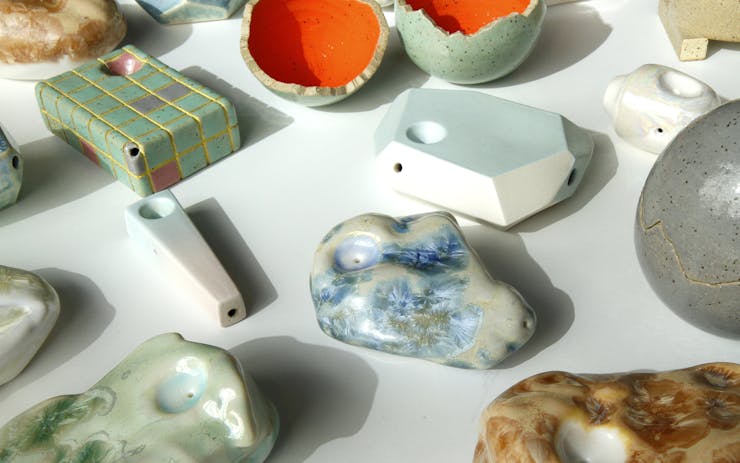Widely represented in visual art, the pot leaf as a symbol predates the written word. The first image of a pot leaf may have been seen in a neolithic cave painting in Japan, and as recognition and reputation spread, cannabis imagery was engraved in Egyptian secular monuments, drawn into religious texts, and in artsy botanical illustrations in manuscripts.
Widely represented in visual art, the pot leaf as a symbol predates the written word.
As cannabis became more common—and later prohibited—cannabis art could be seen in anti-drug propaganda. Its popularity in American western culture catapulted by 1968, when you could open an issue of Gilbert Shelton’s avant-garde underground comicThe Fabulous Furry Freak Brothers and enjoy colorful characters scoring weed and smoking joints on their humorous mishaps and adventures.
The pot leaf is an icon, and the culture surrounding it is finally coming out of the shadows, embracing a sophisticated, artful take on cannabis and modern design.Load Your Pipe With a New Strain
What Makes High Art?
“Artists often work in territories outside the mainstream and have a long history of subverting boundaries around high and low art. It makes sense cannabis and art would intersect in an artist’s studio, where the aesthetic of an industry traditionally associated with kitsch and ‘low art’ can be broken down and reimagined with a higher degree of complexity,” shared Astrelle Johnquest, curator and founder of Now Space, an alternative space art gallery and hybrid vintage boutique in El Sereno, on the east side of Los Angeles.
The innovation and style that newer artists are bringing to the table makes it exciting to own a creatively designed piece again.
Her interest in this intersection manifested recently in PipeDream LA, a cannabis pop-up she hosted with curator and Los Angeles-based stylist Michael Cioffoletti at Wittmore, a fancy retail store in the arts district. The higher-end retail engagement encouraged consumers to view pipes and other weed merchandise differently than in a head shop, and rethink how they connect with cannabis.

(Courtesy of Now Space)
PipeDream LA featured original artful pipes created by individual and collective artists. After fleshing out their concept, Astrelle and Cioffoletti approached the pop- up the same they would any gallery exhibit. They had studio visits and detailed conversations with artists about their pipe-making practices. “It was really important for us to be able to talk about the work and back-story of each artist we included in the pop-up,” she explained.
The well-curated selections include gorgeous geode pipes by Jackei Laurita Cortese. Functional, the crystal-glazed ergonomic rock-like pipes could be used for 420 but would be stunning as décor on a shelf in a home.
Contemporary Art in the Cannabis Space

(Courtesy of Now Space)
The pipe as contemporary sculptural art object is not a giant leap; Bob Snodgrass started the beautiful color-changing borosilicate glass pipe movement in Oregon over 30 years ago. Unfortunately, bad imitations and Chinese-mass-manufactured bulbous glass pipes are sold in every gas station today, and it can be a challenge to get an affordable glass pipe as unique as a Snodgrass or any of his apprentices. But the innovation and style that newer artists are bringing to the table makes it exciting to own a creatively designed piece again.
Ceramicist Michelle Summers makes one-of-a-kind one-hitters by etching each of her enchanted illustrations into the porcelain, and she inlays the glaze before firing which gives it a cool, raw, and hand-drawn feel to her work. Eunbi Cho’s pipes throwback to the goodness of 80’s modular design, with lovely structure and fluidity. Whether it’s her traditional pipe or the rectangular Enlightener, Cho’splayful approach and use of custom colors make using it special. Savvy but simple pipes by Ben Medansky showcase his process exploring variations on radial symmetry and grids, while still producing an excellent smoking utensil.
But pipes aren’t the only tasteful cannabis art emerging with legalization. Debra Broz rescues vintage porcelain figures from thrift stores and uses ceramic restoration techniques to bring them back to life (with a twist). She changes the antique narrative by adding subversive elements, like the iconic pot leaf and a smoking joint to “Weed Panda.”

(Courtesy of Now Space)
Craighill, a high-end home goods brand, created a custom rolling tray for Wittmore, applying their particular design philosophy with an emphasis on industrial experimentation and basic utility.
As retail paves the way for the artistic cannabis marketplace, we should see tasteful art experiences appearing more often.





